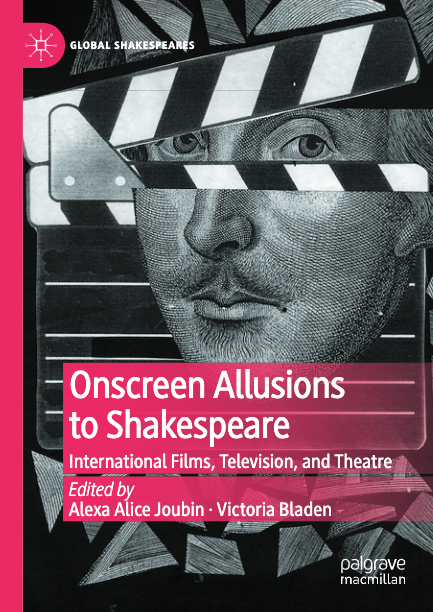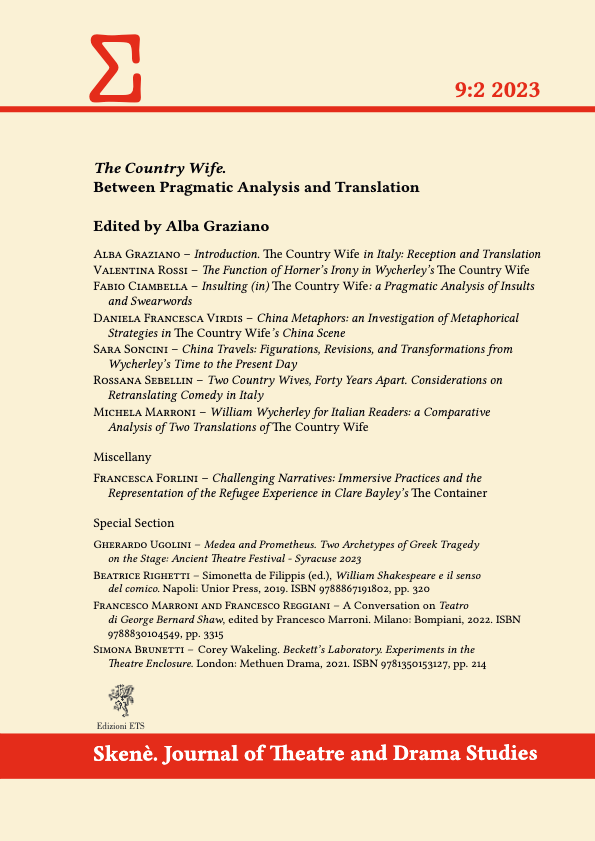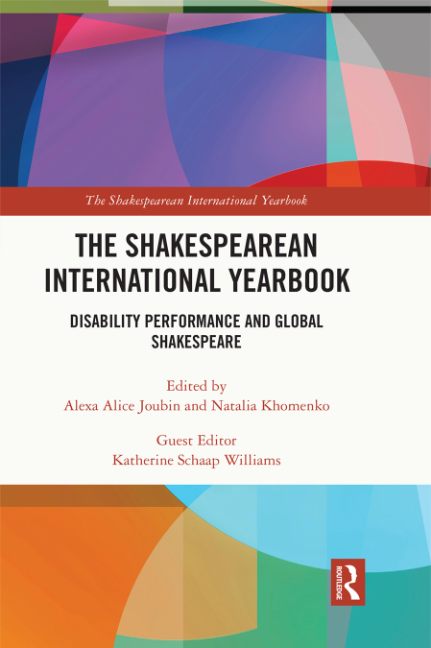Onscreen Allusions to Shakespeare: International Films, Television, and Theatre
Edited by Alexa Alice Joubin and Victoria Bladen
Palgrave Macmillan, 2022 (read an illustrated excerpt with film clips here)
Table of Contents
Introduction to Onscreen Allusions to Shakespeare by Alexa Alice Joubin and Victoria Bladen
The Boundaries of Citation: Shakespeare in Davide Ferrario’s Tutta colpa di Giuda (2008), Alfredo Peyretti’s Moana (2009), and Connie Macatuno’s Rome and Juliet (2006) by Maurizio Calbi
Antipodean Shakespeares: Appropriating Shakespeare in Australian Film by Victoria Bladen
Othello Surfing: Fragments of Shakespeare in South Africa by Chris Thurman
Shakespeare in Bits and Bites in Indian Cinema by Poonam Trivedi
What “Doth Grace for Grace and Love for Love Allow”? Recreations of the Balcony Scenes on Brazilian Screens by Aimara da Cunha Resende
“Mon Petit Doigt M’a Dit …”: Referencing Shakespeare or Agatha Christie? by Nathalie Vienne-Guerrin
Shakespeare’s Julius Caesar in Federico Fellini’s Roma by Mariacristina Cavecchi
“Still Our Contemporary” in East-Central Europe? Post-Socialist Shakespearean Allusions and Frameworks of Reference by Márta Minier
Soviet and Post-Soviet References to Hamlet on Film and Television by Boris N. Gaydin, Nikolay V. Zakharov
Afterword by Mark Thornton Burnett
Did you realize there are copious references to Shakespeare in Marvel’s Shang-Chi and the Legend of the Ten Rings?
In this study of “fragmented” allusions to Shakespeare in films that have otherwise nothing to do with Shakespeare, we discover a rich but hitherto unknown network of cross references.
Shakespeare’s plays and motifs have been appropriated in fragmentary forms on screen since motion pictures were invented in 1893. Allusions to Shakespeare haunt our contemporary culture in a myriad of ways, whether through brief references or sustained intertextual engagements.
This collection of essays extends beyond a US-UK axis to bring together an international group of scholars to explore Shakespearean appropriations in unexpected contexts in lesser-known films and television shows in India, Brazil, Russia, France, Australia, South Africa, East-Central Europe and Italy, with reference to some filmed stage works.
Analyzing Shakespeare’s spectral presence in modern culture, the Introduction argues that tattered allusions to Shakespeare circumvent the question of “fidelity,” because they constitute a wink to, rather than admiration of, Shakespeare.
Keywords: theory of allusion, Shakespeare, spectral citation, intertextuality, Russia, Brazil, Australia, South Africa, France, Italy, India, East-Central Europe.
Illustrated excerpt with film clips
Background: This volume is dedicated to the loving memory of the late Mariangela Tempera (1948–2015), scholar, educator and founder of Centro Shakespeariano Ferrara, Italy, whose pioneering work in the study of Shakespeare adaptations continues to inspire us. Here is an obituary written by Ton Hoenselaars and published by the Shakespeare Association of America.
To celebrate the twentieth anniversary of the Centro Shakespeariano Ferrara, Professor Tempera organized a conference, “Shakespeare in Tatters: Referencing His Works on Film and Television,” in Ferrara, May 10–11, 2013, where the essays in this collection first took shape. Conference program in PDF format.
Funding: The co-editors of this book gratefully acknowledge the support of the Centro Shakespeariano Ferrara, Dipartimento di Studi Umanistici at the Università degli Studi di Ferrara, Dipartimento di Lingue e Letterature Straniere of the Università degli Studi di Milano, Comune di Ferrara Assessorato alla Cultura Turismo e Giovani, the Institut de recherches sur la Renaissance, l’âge Classique et les Lumière of the Université Montpellier 3 Paul Valéry in France, the Russian Foundation for the Humanities, the National Research Foundation of South Africa, Facultad de Filosofía y Letras of the Universidad Nacional Autónoma de México and Gandarela Cultural Complex and the Globe Brasil.
Book Review in Skenè. Journal of Theatre and Drama Studies 9.2 (2023) by Melissa Croteau (PDF)
“The title of this superlative recent volume of essays, edited by Alexa Alice Joubin and Victoria Bladen, boldly announces its focus on a topic that could be seen as trivial: mere allusions to Shakespeare and his works in screen texts. The films and shows covered therein are not screen adaptations of Shakespeare, which are the subject of a great many books. Instead, the essays in this volume examine brief Shakespeare references in film or television texts.”
“This study continues the ongoing work of postmodern and cultural studies strategic goals to read all cultural products and practices as texts that reveal the multiple potential meanings of any given text, which is always already embedded in multifarious contexts. The essays in this volume demonstrate that the Bard has been and is a ubiquitous presence in international media in the twentieth and twenty-first centuries, evidenced by the fact that each essay looks at film and/or televisual texts from a different country.”
“Refreshingly, Joubin and Bladen contend that this volume examining Shakespearean allusions extends beyond the question of whether a screen text is or is not “Shakespeare(an)”, instead focusing “further along the intertextuality continuum” to look at the often powerful ideological and artistic work performed by brief references to Shakespeare. Indeed, the Bard’s brief appearances in screen texts like these, as adeptly argued in this volume, help keep Shakespeare alive in significant ways, rather than damning him to a purgatorial half-life.”
Onscreen Allusions to Shakespeare is also reviewed in the Shakespearean International Yearbook: Disability Performance and Global Shakespeare (2024).
Roderick Hugh McKeown writes that “An allusion may be isolated and fleeting, or part of a sustained engagement with a hypotext; “international” might refer to post-colonial India, settler-colonial Australia, European countries, or their former colonies; the screens involved may range from the early silent films of the twentieth century to computer screens during the pandemic. The editors have chosen essays that adroitly represent both this geographic diversity and temporal range within specific countries.” [PDF]


